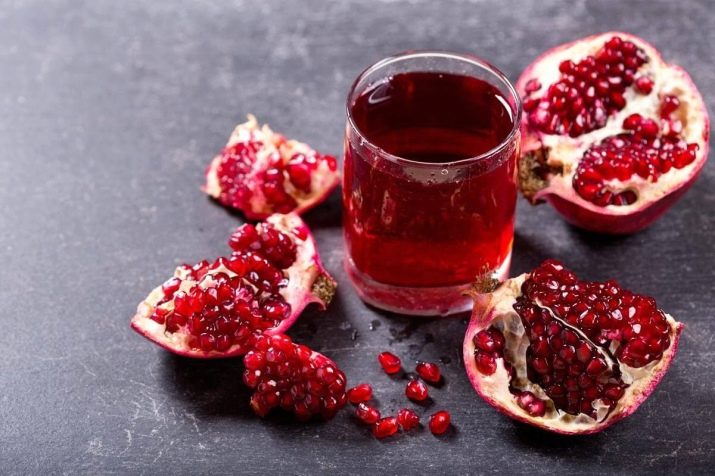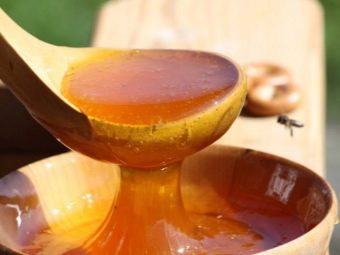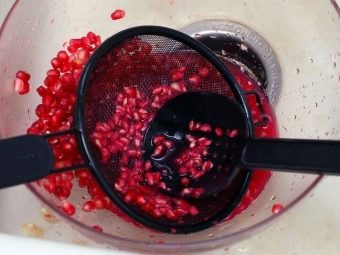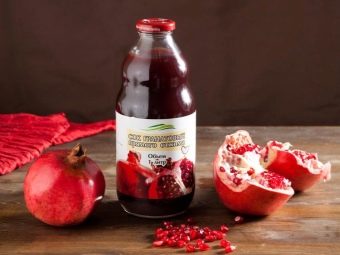Pomegranate juice during pregnancy and lactation

During the period of preparation for childbirth and the first months after that, the woman’s body is under tremendous pressure, and therefore needs strong vitamin and mineral support.For this, it is better to use not pharmacy complexes, but fresh fruits and vegetables, natural products. Pomegranate juice is undoubtedly included in their list.
Benefit
Pomegranate juice includes a large amount of vitamins, micro and macro elements, and at least for this it can be called a useful drink for pregnant women. It strengthens the body, prepares it for the upcoming birth. The presence of vitamins, including ascorbic acid, improves the immunity resistance to viral and catarrhal infections, negative environmental factors.
It contains vitamins C, A, E, PP and group B. If we talk about other valuable components, it is magnesium, calcium, iron, zinc.
The combination of antioxidants, nicotinic acid, vitamins B and iron has a positive effect on the vascular system of a woman - the vascular walls become more elastic, capillary permeability improves.
Iron helps to prevent iron deficiency anemia, which is so frequent when carrying a child. The blood in the required volume is enriched with oxygen and carries it not only to the tissues of the mother's body, but also to the child. This, in turn, reduces the risk of hypoxia, miscarriage and premature birth.
It also contains magnesium and potassium, which strengthen the heart muscle. This is very helpful, because the volume of circulating blood almost doubles by the last trimester.
The positive effect of the drink on the cardiovascular system reduces the risk of thrombosis, normalizes high blood pressure. The fact that its two components - vitamins C and PP, are included in the active components of ascorutin, testifies to the benefits of the drink. The latter is a medical drug prescribed for the threat of preterm birth.
Sodium in the composition, as well as vitamin B normalize the water-salt balance in the body. It is worth mentioning the easy diuretic effect - taking juice allows you to cope with puffiness. However, unlike a number of diuretics, this natural component will not cause the leaching of minerals from the body.
B vitamins also have a beneficial effect on the state of the nervous system of the pregnant woman, as well as the newly-made mother. It allows you to eliminate nervousness, improves cerebral circulation, normalizes sleep.
B9, more commonly known as folic acid, is one of the essential components required during pregnancy. It participates in the formation of the neural tube of the fetus and some internal organs, improves blood circulation between the mother and the fetus.
Vitamin A is involved in the structure of the retina of the fetus, and vitamin E stimulates the synthesis of the hormone progesterone. The latter protects the mother and child from preterm birth. In addition, vitamin E is considered a “beauty vitamin.” With regular use, the complexion and skin condition improves, as an external agent, the drink is used as a preventive measure for stretch marks on the skin.
As part of the drink has vitamin K, which is involved in the process of blood formation. One of its functions is to increase blood clotting. This saves the future mother from uterine bleeding due to a decrease in blood viscosity. This property is valuable both immediately after childbirth, and during breastfeeding, when the body has already lost a lot of blood during childbirth.
The product contains organic acids that help prepare the digestive organs for digesting food. They stimulate the production of gastric juice, which contributes to better assimilation of even heavy food (meat, flour products).
Also included in the dietary fiber and pectin. The first improves intestinal motility, the second - remove toxins. As a result, it is possible to prevent such unpleasant consequences of digestive disorders as a feeling of heaviness and pain in the abdomen, cramps, nausea and heartburn.
With its astringent properties, pomegranate saves from diarrhea. In addition, it has an antibacterial effect, therefore, reduces the risk of dysbiosis, intestinal infections.Finally, the sweet and sour taste of the drink allows you to remove signs of toxicosis.
If the question of whether it is possible to drink pomegranate juice for pregnant women, in most cases, is given a positive answer, then its consumption with HB causes a lot of controversy. First of all, it should be noted that the body of the newly-minted mother does not need the vitamins and microelements as much as before. In addition, it is necessary to restore it after delivery. Finally, the main task of the mother during breastfeeding is the transfer with milk of all the necessary vitamins and trace elements to the fetus.
However, the reception of juice is better to postpone if the baby's body is sensitive to the food of the mother. In other words, if you eat enough harmless foods (a little more vegetables or introduce new cereals), and the kid reacts to it with a skin rash and digestive disturbance, then you should refuse from the consumption of a highly allergenic pomegranate.
If there is no such negative reaction, you can try to introduce a small amount of the drink into the mother’s diet. It will not allow the development of iron deficiency and other vital elements in the mother, which is inevitable when breastfeeding. Vitamins, minerals and antioxidants help preserve the beauty of the mother - improve skin condition, cope with swelling, prevent hair loss.
If the nursing mother for some reason failed to expand her diet by introducing this drink, it should be taken at the end of lactation. This will restore the body, especially if breastfeeding was long, increase hemoglobin, get rid of chronic fatigue.
The first periods after childbirth are usually characterized by profusion and tenderness. But regular intake of juice can neutralize this feature of menstruation.
Harm
Despite the many healing properties of the juice, it can be harmful. First of all, it concerns women suffering from grenade intolerance. Like all red fruits, it is a strong allergen.
However, even in the absence of allergic reactions to pomegranate before pregnancy, the juice should be consumed with small doses. Ideally, conduct a skin test for allergies before taking. Such precautions are related to the fact that during pregnancy and when feeding a newborn there is a strong change in the hormonal background of the woman. This causes unpredictable reactions on the part of the body to seemingly familiar products.
Since the juice of a ruby fruit has an astringent property, its consumption should be abandoned with a tendency to constipation, hemorrhoids, and anal fissures. It is clear that in this case, the drink will be even stronger, causing a deterioration.
Due to the abundance of acids, the drink should not be taken with increased acidity of gastric juice, the acute phase of gastritis, ulcers, pancreatitis and other diseases of the gastrointestinal tract, pancreas. It is not recommended for problems with the kidneys and liver, inflammation of the urinary tract.
Too low blood pressure in some cases becomes the reason for the refusal of the drink or at least reducing its dosage. High acid content may adversely affect the state of tooth enamel, so juice should be drunk through a straw, and in the presence of increased tooth sensitivity, it is better to completely abandon it.
Breastfeeding is not an absolute contraindication to taking pomegranate juice. The mother is allowed to take it in the absence of a negative reaction of the child’s body to it. For women who feed the newborn, there are the same contraindications as described above for pregnant women.
How to drink?
Pomegranate fresh juice is a strong concentration drink, therefore it is not suitable for consumption in its pure form. It must be diluted in half with water. Allowed to increase the amount of water up to 60-70% of the composition. Instead of water it is allowed to add carrot juice.
When anemia pomegranate drink is recommended to be diluted with beet juice. To do this, fresh vegetable rubbed on a grater, and then squeeze the juice. The recommended dosage is 1-2 glasses of diluted juice. Drinking it every day is not necessary - 2-3 times a week is enough.
Starting to enter the product in the menu of a nursing mother should not be earlier than 2 months after delivery. You need to start with small dosages, carefully watching the reaction of the child's body to a new product. When the deterioration of health babies from juice you need to refrain.
When treating anemia, you should drink 100 ml of the diluted drink twice a day for at least 2 months. To fight a cold, you can add a teaspoon of honey to a drink diluted with water (if you are not allergic).
It should be remembered that vitamin C is destroyed by prolonged contact with air, so it is better to prepare the juice immediately before use and not to prepare it in reserve. It is better to drink fresh fresh no later than 20-30 minutes from the moment of preparation.
To reduce the negative impact of juice on tooth enamel allows its consumption through a straw or rinsing the mouth immediately after ingestion.
How to choose and store?
These healing properties are more true for freshly squeezed pomegranate fresh. Only in this case, you can guarantee the naturalness of the drink. Thus, it is better to prepare the juice yourself, squeezing it out of pomegranate seeds.
However, it is important to remember that the result is a highly concentrated composition, so it should be consumed, just following the dosage and making sure that there is no allergy.
Pomegranate formulations of industrial production contain, in addition to juice, preservatives. In addition, some of its beneficial properties (for example, ascorbic acid) can be destroyed due to thermal exposure or contact with oxygen. The danger of the consumption of such beverages may lie in the possibly high sugar content in it.
If you still have to purchase a drink of industrial production method, you should give preference to the product in glass bottles. Pay attention to the shelf life and on the date of production. The less time has passed since the juice production, the better. Open juice should be drunk within 3 days. Not recommended for longer storage.
You should choose the juice, the country of origin of which coincides with those regions where this multi-seed berry is grown (and the pomegranate, from the point of view of botany, is the berry). This may be Abkhazia, the Crimea, the south of Russia, Armenia, Georgia, Iran, Azerbaijan, Asia, etc.
The composition of the store juice, of course, can not be completely natural. The duration of its storage provide preservatives. If among the list of ingredients there is E202, you should not refuse to purchase. It is a natural and therefore relatively safe preservative. But the dyes, flavors and sugar in a quality drink should not be.
It should be made from the pulp of the fruit. Adding peels to the drink is a reason to stop consuming because there are hazardous compounds in the peel. In large quantities, they can cause intoxication.
Store the juice should be in the refrigerator. When stored in room conditions, the drink can ferment.
Recommendations
Reviews gynecologists suggest that the juice of pomegranate can significantly strengthen the immune system of women and copes with toxicosis. According to experts, in the absence of contraindications, it must be included in the menu of a pregnant woman.
Pomegranate fresh can be used as a basis for the preparation of a tonic drink. To do this, you will need to mix pomegranate juice, carrots and beets in a 2: 3: 1 ratio. It is especially useful for low hemoglobin and vertigo.
You will learn more about pomegranate juice in the following video.


































